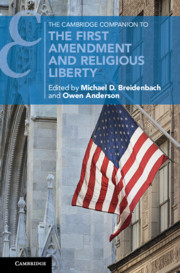Book contents
- The Cambridge Companion to the First Amendment and Religious Liberty
- Cambridge Companions to Law
- The Cambridge Companion to the First Amendment and Religious Liberty
- Copyright page
- Dedication
- Contents
- Notes on Contributors
- Acknowledgments
- Introduction
- Part I Philosophical Foundations
- 1 The First Amendment and Natural Religion
- 2 The Philosophical Meaning of Religious Exercise
- 3 Freedom of Religion
- Part II Historical Interpretations
- Part III Law, Politics, and Economics
- Index
2 - The Philosophical Meaning of Religious Exercise
from Part I - Philosophical Foundations
Published online by Cambridge University Press: 17 December 2019
- The Cambridge Companion to the First Amendment and Religious Liberty
- Cambridge Companions to Law
- The Cambridge Companion to the First Amendment and Religious Liberty
- Copyright page
- Dedication
- Contents
- Notes on Contributors
- Acknowledgments
- Introduction
- Part I Philosophical Foundations
- 1 The First Amendment and Natural Religion
- 2 The Philosophical Meaning of Religious Exercise
- 3 Freedom of Religion
- Part II Historical Interpretations
- Part III Law, Politics, and Economics
- Index
Summary
This essay argues that religion is a distinctive form of human activity, and offers a philosophical account of what religion fundamentally is (and what it is not), within the context of the free exercise clause of the First Amendment. The first section promotes religion as an action-theoretic concept. The second section presents the claim that atheism can be regarded as a religion. It rejects this claim on the basis that religion cannot be defined as a set of propositional beliefs concerning metaphysics and morality. The third section defends a paradigmatic account of religion as a kind of activity ordered to a concept of transcendence or superior nature, and argues that morally excellent human actions can be identified as religious, but only in a secondary or derivative way. The final section contends with the problem of including act-omissions as instantiations of religious exercise, and proposes a solution with reference to recent arguments implicating two-way powers.
Keywords
- Type
- Chapter
- Information
- Publisher: Cambridge University PressPrint publication year: 2020
- 1
- Cited by

